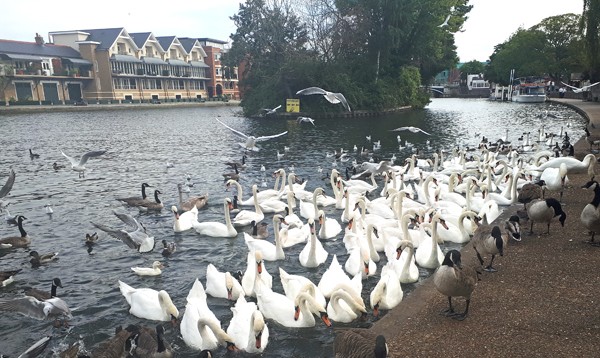Bird flu cases have unfortunately been found locally and to help reduce spread Defra has established a temporary disease control zone covering 3km (1.86 mile) in all directions from the Thames at Eton, where infected swans were recently identified.
A spokesperson for the Royal Borough of Windsor & Maidenhead, said: “As a result of cases recently identified in a number of swans on the River Thames at Eton, Defra has implemented a localised bird flu disease control zone as a temporary and precautionary measure to help minimise the spread. The infected birds were also put down by Defra vets.
“The local zone covers a 3km (1.86 mile) radius from the river at Eton and requires all bird keepers, regardless of flock size, to undertake additional biosecurity precautions, over and above those already implemented nationally. The Royal Borough is working closely with Defra and the Animal and Plant Health Agency to implement the controlled zone and notify bird keepers of the zone and associated requirements, which are available here.
“Following advice of the Animal and Plant Health Agency, we will be putting in place, on a precautionary and temporary basis, targeted and proportionate measures focussed around the affected area. Signage will be in place from Monday and we are asking everyone to play their part in helping to minimise spread in order to protect our swans, other waterfowl and commercial poultry flocks.
“From Monday 10th January, people have been required to keep dogs on leads along the eastern and western riverbanks at Windsor and Eton, including adjacent grassy areas such as The Brocas. This gives owners more control over their pets and reduces the risk of dogs getting involved with potentially-infected bird mess on the riverbanks and spreading the infection on their feet.
“Also from Monday, signage will be up asking people not to feed the swans at Eton and Windsor for the time being, in order to reduce public footfall to the riverside and discourage swans and other waterfowl from congregating closely together to get food. But don’t worry, the swans won’t go hungry as the charity Swan Support has agreed to monitor the swan population on the river and feed in a measured way.”
• If you find dead wild waterfowl such as swans, geese or ducks, or other dead wild birds, such as gulls or birds of prey, please let Defra know on 03459 33 55 77. Do not touch dead or sick wild birds.
• More information about bird flu is available here. Bird keepers needing advice or guidance can contact trading.standards@rbwm.gov.uk
A spokesperson for the Royal Borough of Windsor & Maidenhead, said: “An Avian Influenza Prevention Zone came into force across the UK in November 2021, in response to rising cases of bird flu linked to migrating birds. Avian influenza is primarily a disease of birds and cases have been confirmed at 72 locations and rising across the UK.
“National public health advice remains that the risk to human health is very low and poses a very low food safety risk, however it does pose a threat to wild birds such as swans and to captive poultry flocks and measures are focussed on minimising transmission.












